Cracking the Spiritual Code of the Parables
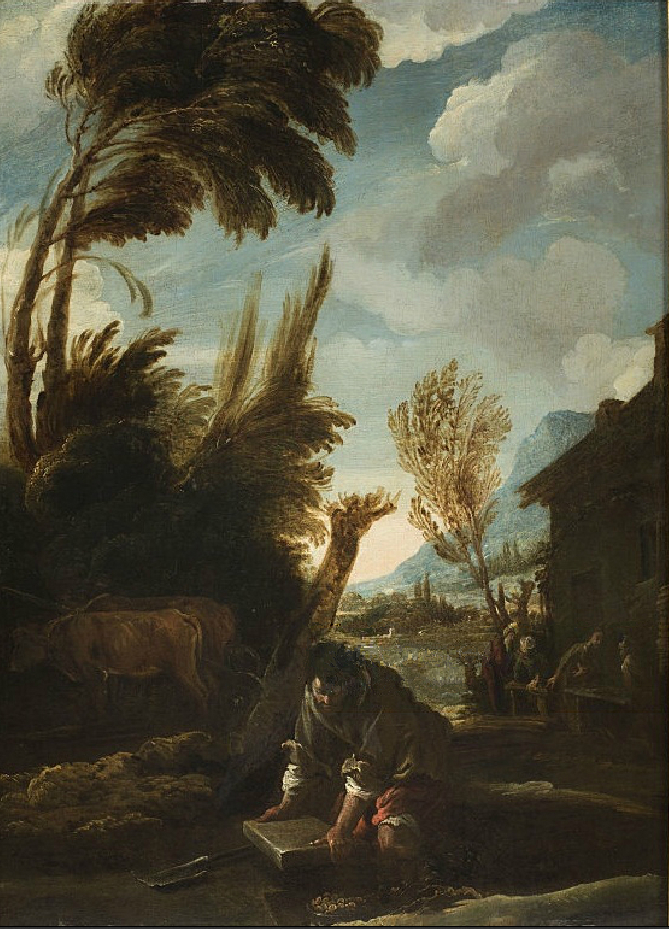
Parable of the Hidden Treasure
“The Kingdom of Heaven is like treasure hidden in the field, which a man found and hid. In his joy, he goes and sells all that he has and buys that field.”
Matthew 13:44
“The living presence of God is wisdom hidden in the Scriptures, which a sinner discovered and took to heart. In his joy, he goes and converts and believes that Scripture.”
TSM interpretation
The secrets of the Bible begin with the parables of Jesus. These brief pointed anecdotes are more than what they appear to be, for the simple surface narratives conceal deeper revelations that were not meant for everyone.
Jesus may have explained their meanings to his disciples, but only a few of those were written down. Since the Early Fathers of the Church, however, various scholars and teachers have sought to understand their hidden meanings by exploring the symbolic basis of the Bible. They have proposed numerous readings to explain the parables and other enigmatic passages littering the Holy Scriptures. They believed that if they could just crack the spiritual code of the parables, they might unlock a higher, more insightful meaning for advanced students not only to the parables but many difficult passages in the text.
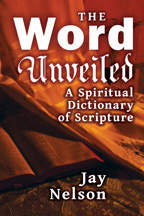
For the last twenty years or so, I have diligently hunted down these figurative definitions of Biblical words and phrases through innumerable sermons, commentaries, and books of theology, particularly those of the first centuries. At this point, my sources include definitions derived from 9 books of Scripture, 6 extra-Biblical texts, 52 works of the Early Church Fathers, 5 books of Aramaic/Hebrew idioms, and 18 reference books by modern preachers and scholars. A large collection of orphaned attributions from scattered sources have also been assembled. All these results I carefully distilled down and compiled into a spiritual dictionary, The Word Unveiled.
Since publication during the pandemic, the database behind this effort has since grown tremendously. More sources have been added. Much effort has been put into enlarging and transforming the dictionary where meanings had been cooked down into a mere 1,100 definitions into a expansive table of over 16,500 individual entries. Each specific line of data contains fields with information about the term’s use, and the interpretation of every word or phrase is weighted both by authority and popularity.
But that is just the beginning. The first purpose of this collection of thousands of allegorical definitions of Biblical terms into one list is to crack the spiritual code of the parables. I plan to show that they can be solved by a simple textual replacement technique. Characters can be identified; spiritual issues made clear; and even why this information was hidden can be understood. Not only that, but new symbolic meanings of terms may be logically derived to further extend the potential of these techniques.
Once that is demonstrated, the fun really begins. Artificial Intelligence will be employed to see if these methods may be usefully applied to other Biblical texts. If that is possible, then who knows what buried treasures may be found?
A unique, possibly revolutionary, experiment in Biblical interpretation and computing has now begun.
Latest Posts on the Spiritual Code
- A Fish Tale
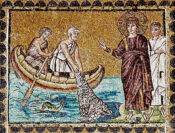 Jesus’ final parable at the end of his first discourse in Matthew from the boat takes advantage of the setting, for it’s all about fishing. Fish and boats become a common theme of his ministry, figuring in so many stories that the fish was adopted later on as a secret symbol of the faith. It…
Jesus’ final parable at the end of his first discourse in Matthew from the boat takes advantage of the setting, for it’s all about fishing. Fish and boats become a common theme of his ministry, figuring in so many stories that the fish was adopted later on as a secret symbol of the faith. It… - First Hints of the Kingdom
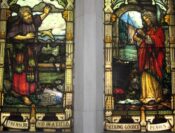 Along with the Mustard Seed story in Matthew come several other one-liners that are almost as famous. The Good News in his first parables did not seem much like good news, as the gist of those was that the world was going to end and most people would not be saved. But these are found…
Along with the Mustard Seed story in Matthew come several other one-liners that are almost as famous. The Good News in his first parables did not seem much like good news, as the gist of those was that the world was going to end and most people would not be saved. But these are found… - Cutting the Mustard
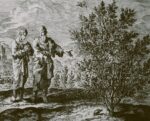 One of Jesus’ shorter, but for some reason, best remembered parables, is that of the Mustard Seed. Yet, like many of his better-known images, this one is a little shocking. The seeds of mustard plants can be ground to create the yellow condiment that goes best with hot dogs and the leaves are edible, too.…
One of Jesus’ shorter, but for some reason, best remembered parables, is that of the Mustard Seed. Yet, like many of his better-known images, this one is a little shocking. The seeds of mustard plants can be ground to create the yellow condiment that goes best with hot dogs and the leaves are edible, too.… - Secret Growth
 The Parable of the Sower during Jesus’ famous preaching debut from the boat was just the start of his work that day. He later explained that one in detail privately to the disciples. Then he dealt out a handful of brief, pithy parables in rapid succession. In the Gospel of Mark, there is one parable…
The Parable of the Sower during Jesus’ famous preaching debut from the boat was just the start of his work that day. He later explained that one in detail privately to the disciples. Then he dealt out a handful of brief, pithy parables in rapid succession. In the Gospel of Mark, there is one parable… - Rising Again from the Grave
 Welcome to the new Word Unveiled blog! This used to be the site of my Heaven and Earth blog, which covered all things therein. However, with my deepening focus on Biblical interpretation, it was long overdue for a brand-new start. It has been delayed due to family, floods, and a funeral, and things may change…
Welcome to the new Word Unveiled blog! This used to be the site of my Heaven and Earth blog, which covered all things therein. However, with my deepening focus on Biblical interpretation, it was long overdue for a brand-new start. It has been delayed due to family, floods, and a funeral, and things may change… - Jesus Explains the Parable of the Weeds
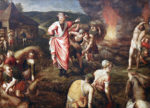 There are only thirty or so major parables that Jesus gave in the New Testament, although he used a lot of figures and symbols in his teachings. But no explanations that he gave at the time to the disciples were handed down – except for two. Jesus explains the very first parable, the famous Parable…
There are only thirty or so major parables that Jesus gave in the New Testament, although he used a lot of figures and symbols in his teachings. But no explanations that he gave at the time to the disciples were handed down – except for two. Jesus explains the very first parable, the famous Parable… - Jesus the Dangerous Storyteller
 Jesus first gained fame as a healer and wonder-worker. If making the blind see and the lame walk weren’t enough, surely the reputation of turning water into wine or feeding thousands would be enough to make anyone popular. But the real purpose of miracles seems to have been to draw crowds and make them more…
Jesus first gained fame as a healer and wonder-worker. If making the blind see and the lame walk weren’t enough, surely the reputation of turning water into wine or feeding thousands would be enough to make anyone popular. But the real purpose of miracles seems to have been to draw crowds and make them more… - Bread and Wine, Body and Blood
 Traditional Catholic teaching states that during the Mass, the bread and wine are mysteriously transformed into the Body and Blood of Jesus Christ. In Catholicism, this miraculous change is called “transubstantiation.” This means that once the sacred words of Consecration are spoken there is a real, total cosmic transmutation of the blessed elements. Even if…
Traditional Catholic teaching states that during the Mass, the bread and wine are mysteriously transformed into the Body and Blood of Jesus Christ. In Catholicism, this miraculous change is called “transubstantiation.” This means that once the sacred words of Consecration are spoken there is a real, total cosmic transmutation of the blessed elements. Even if… - Cracking the Code of the Parables
 If one goes looking for secret meanings in the Bible, the parables of Jesus are the most logical place to begin. By definition, they conceal secrets, for a parable is a story that makes its point by hiding it beneath another superficial story, after all. Yet, Jesus apparently never had any hope that all those…
If one goes looking for secret meanings in the Bible, the parables of Jesus are the most logical place to begin. By definition, they conceal secrets, for a parable is a story that makes its point by hiding it beneath another superficial story, after all. Yet, Jesus apparently never had any hope that all those… - Why Parables?
 A parable is a short allegorical tale from which the listener is expected to take a lesson. It is a literary form related to poetry, fables, wise sayings, and edifying and instructional literature in general, in that a parable seeks to impart helpful information under the guise of an interesting story. But while a parable…
A parable is a short allegorical tale from which the listener is expected to take a lesson. It is a literary form related to poetry, fables, wise sayings, and edifying and instructional literature in general, in that a parable seeks to impart helpful information under the guise of an interesting story. But while a parable…
